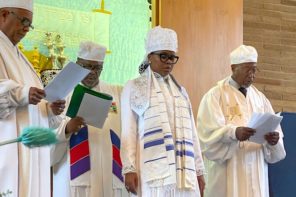With the installation of Rabbi Denise Eger as the president of the Southern California Board of Rabbis, on May 11th, another milestone will have been passed in the advancement of GLBT rights within the organized Jewish world. It takes a little bit of unpacking, however, to figure out exactly what that milestone is, and what the road ahead looks like.
Eger, a lesbian, is the spiritual leader of Reform-affiliated Congregation Kol Ami (“the voice of my people”) in West Hollywood, a GLBT-oriented community that is equally welcoming of straight allies and interfaith families. This is no great scandal in the Reform movement, which, along with Reconstructionism, has long championed full inclusion of GLBT Jews, including an almost decade-old policy of religiously sanctioning same-sex marriages.
The Conservative movement began to open itself up officially to gay and lesbian Jews about two years ago, though it’s important to bear in mind the distinct mechanism of this particular process. Unlike Reform and Reconstructionism, Conservatives do consider themselves bound by halakha the articulation of Jewish law theoretically extending back to the God-Moses moment on Sinai. Whereas the movements beginning with “R” give themselves the latitude to rule ex cathedra that gays and lesbians are welcome, Conservative Jews (not to mention the Orthodox) must find some way to square this socially enlightened perspective with the book of Leviticus.
When, two years ago, the Conservative movement did find a way to accept the ordination of openly gay and lesbian Jews as rabbis and cantors, and to condone commitment ceremonies (as opposed to marriages) it was through a tshuva (a halakhic ruling) that differentiated between the type of sodomy prohibited in the Torah, and the loving relationships that form the basis of contemporary same-sex bonds (and the legal fiction that these loving couples wouldn’t perform anything like those Torah-prohibited acts, nudge nudge, wink wink.)
At the same time, other, less permissive tshuvot were issued, comparable to minority opinions, except for the fact that it remains up to the various institutions within the movement to determine which tshuva they will follow. The two Conservative rabbinical schools in the US have gone with the accepting tshuva, whereas the Israeli seminary has proved the reactionary element. (This is a story for another day.)
The issue is pretty much a non-starter in the Orthodox world, except for a notable handful of fringe-rabbis pushing for more inclusiveness, and what I assume to be a significant number of modern Orthodox (as opposed to ultra-Orthodox) Jews who have plenty of sympathy for gays and lesbians, and probably number many of them among their friends, but can’t yet see a way to harmonize this personal sentiment with their larger religious commitments.
It’s important to bear this denominational scorecard in mind when considering Eger’s appointment, because a “board of rabbis” is, in its essence, a trans-denominational body. Existing in most major Jewish population centers, the entity is a kind of trade association where rabbis from different backgrounds come together for the sake of “fellowship, religious camaraderie, educational enrichment, and to speak with a single voice on behalf of our Jewish community.” When, for the first time, a lesbian rabbi is tapped to head such a body, it’s a chance to see if denominations that haven’t come to new conclusions about gay rights will accept, at least partially, the authority of those that have—a little like wondering if an Iowa marriage will be accepted in Alabama.
So far so good. As reported in the Forward, the Orthodox members of the board have pledged to work with their new chief, who seems to have already attained the status of beloved colleague. But, as the Forward story also makes clear (and this is a pretty big but), Orthodox acquiescence is largely based on the fact that the hardliners have already left the building, leaving the Southern California board, for some time now, with a decidedly liberal consensus that is not necessarily a microcosm of the larger Jewish world.
Jewish unity, enshrined in the Hebrew phrase klal Yisrael (roughly “the totality of Israel”) is a thousands-of-years-old value. Those rabbis that chose to serve on trans-denominational boards with their ideological opponents invoke it as their justification. By one reading, Eger’s appointment indicates that gay and lesbian Jews who have found a place for themselves in liberal movements may receive de facto acceptance from more conservative (small “c”) strands under the rubric of klal Yisrael.
At the same time, the board’s composition does seem to point to the resemblance of the contemporary Jewish world to two trains picking up steam as they move down the same track in opposite directions, and my heart goes out to those of the Modern Orthodox who seem sometimes to be serving as human linchpins, with one leg on each engine.




